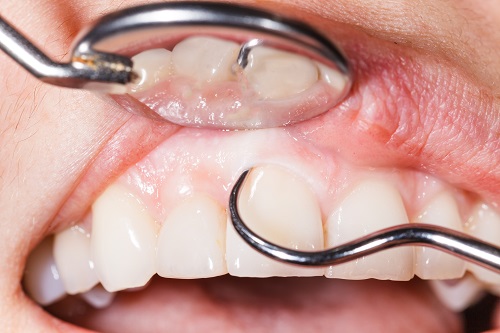From a young age, we’re told we must brush twice daily and floss once a day to protect our teeth from plaque. Hopefully, as adults, we continue following this advice, but it’s important to know a little about what we’re fighting with our toothbrushes and floss. It takes only 48 short hours for plaque to become tartar, which can put your teeth and gums in serious jeopardy.
Once you have tartar buildup, you can’t remove it without your dentist’s help. LVI-trained Dr. John Schmid and his team can help you restore and maintain your dental health by removing tartar and advising you on best practices to keep your teeth and gums in optimal condition.
What is Dental Plaque?
Dental plaque is a sticky biofilm that forms on the teeth as a result of carbohydrate residue mixing with bacteria. For instance, when you drink a soda or eat a piece of cake, sugars and starches stick to the teeth. Naturally occurring bacteria in the mouth then feed on these particles, which creates acid.
These acids can eventually erode tooth enamel. Healthy enamel is hard and strong and protects your teeth from cracking when you chew and bite. The dentin beneath the enamel is softer than enamel and is sensitive to temperature and some acidic or sweet substances. Without adequate enamel, it can be painful to take a breath on a cold day, sip hot soup, or eat sweet foods.
Additionally, when tooth enamel erodes, the integrity of your teeth is compromised. Your teeth will become more susceptible to breakage and may also appear discolored.
What is Tartar?

When plaque is left on the teeth, a mineralization process occurs. Tartar, or dental calculus, is essentially hardened plaque that will trap stains and bacteria and wreak havoc on your dental health.
At its worst, tartar will accumulate along the gum line, where bacteria can aggravate your gums and potentially cause gum disease. If gum disease progresses from gingivitis to periodontitis, you can develop pockets between the teeth and gums. These pockets can get infected, which can lead to a host of health issues.
Tartar removal is an important part of your regular dental cleanings. Our hygienists have special tools to safely and effectively remove tartar deposits. We can also address existing gum disease with deep cleanings, if necessary, to get you back on track for good oral health.
Stopping Tartar Before it Starts
Consistent home care is key since your best line of defense against tartar is prevention. By frequently removing plaque through brushing and flossing, you prevent acids from eating enamel, and you protect the teeth against decay and infection.
Dr. Schmid advises brushing after each meal or snack, if possible. If you can’t brush, rinsing your mouth with water will help reduce the amount of plaque and bacteria that lingers until you can brush. If you are struggling to control plaque, our team may recommend an electric toothbrush, water flosser, mouthwash, or other techniques to better keep the bacteria at bay.
We also advise bi-annual visits to our office for professional cleanings. Our hygienists are trained to spot and remove plaque and tartar that you may not be able to reach with your normal brushing and flossing routine. As early detection is key to avoiding serious oral health issues, Dr. Schmid will also do a full exam of your mouth and jaw at these visits.
Contact Us for a Consultation
We are proud to serve the Austin, Lakeway, West Lake Hills, and surrounding areas. If you think you have tartar build up, haven’t had a professional cleaning in over six months, or have other dental concerns, please contact us at 512-329-5967 to schedule a cleaning or a dental health consultation.
